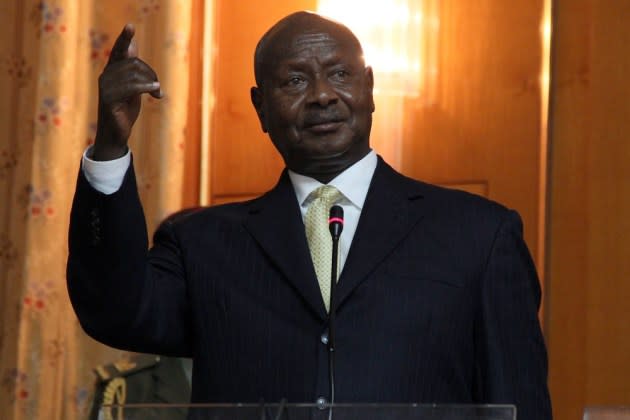Uganda Bans Secondhand Apparel Imports
- Oops!Something went wrong.Please try again later.

Ugandan President Yoweri Museveni has instituted a ban on secondhand clothing imports from foreign markets to support the country’s domestic apparel and textile industry.
Museveni made the announcement during a Thursday visit to Sino-Uganda Mbale Industrial Park, the site of 40 factories developed with China via a 2018 partnership between Museveni and China Foreign Minister Wang Yi. The campus features factories that manufacture building materials, household appliances, glass, furniture, textiles and apparel, like jeans.
More from Sourcing Journal
“We invested in the textiles because now they have been given a new strength to chase away secondhand clothes,” Museveni told workers and state officials. “We have people here who produce new clothes but they cannot infiltrate the market,” because “clothes are shipped here for our people to purchase and wear.”
“There is no one who will stand in my way when he sees this picture here,” he said, speaking of the burgeoning textile factories at the park. The head of state told Chinese investors also in attendance, “Don’t be discouraged—we are going to sort it out, and we won’t allow these secondhand clothes to enter our country anymore.”
Uganda will ban used clothing imports from western markets starting Sept. 1, he said during the televised appearance. Museveni also announced that the government would be commissioning the construction of 15 new factories at the Mbale Industrial Park, saying that it has already broken ground on nine new facilities. At full capacity, the park could house 55 factories and employ 15,000 Ugandans.
The deluge of used apparel goods has been a point of contention for some time, with the East African Community, a regional collective of countries working toward shared economic interests including Kenya, Uganda, Tanzania, Burundi and Rwanda having agreed to ban on used clothing seven years ago. But by the commitment deadline in 2019, only Rwanda had implemented the ban. Former President Donald Trump revoked the country’s Africa Growth and Opportunity Act (AGOA) membership, which provided duty-free benefits for exports to the U.S. The U.S. Trade Representative (USTR) said the country “was not making sufficient progress toward the elimination of barriers to United States trade and investment,” including a refusal to reverse the ban on used clothing.
East African nations like Uganda and Kenya, which are beneficiaries of the AGOA trade preference program, claim that the tons of secondhand goods are stifling the growth of their domestic industries, effectively negating the market benefits that come with being a part of the treaty. A 2022 economic survey showed that Kenya brought in 183,830 tons of secondhand apparel during 2021, up 20 percent from the year prior, even as the country works to rebuild its own textile industry and cotton sector. Data from British philanthropic foundation Oxfam shows that 70 percent of more of the garments donated to charity in the U.S. and Europe are shipped to Africa.
Museveni wants Uganda to support domestic producers. “I have decided to put my foot down and say no to imported second-hand clothes,” he said.

